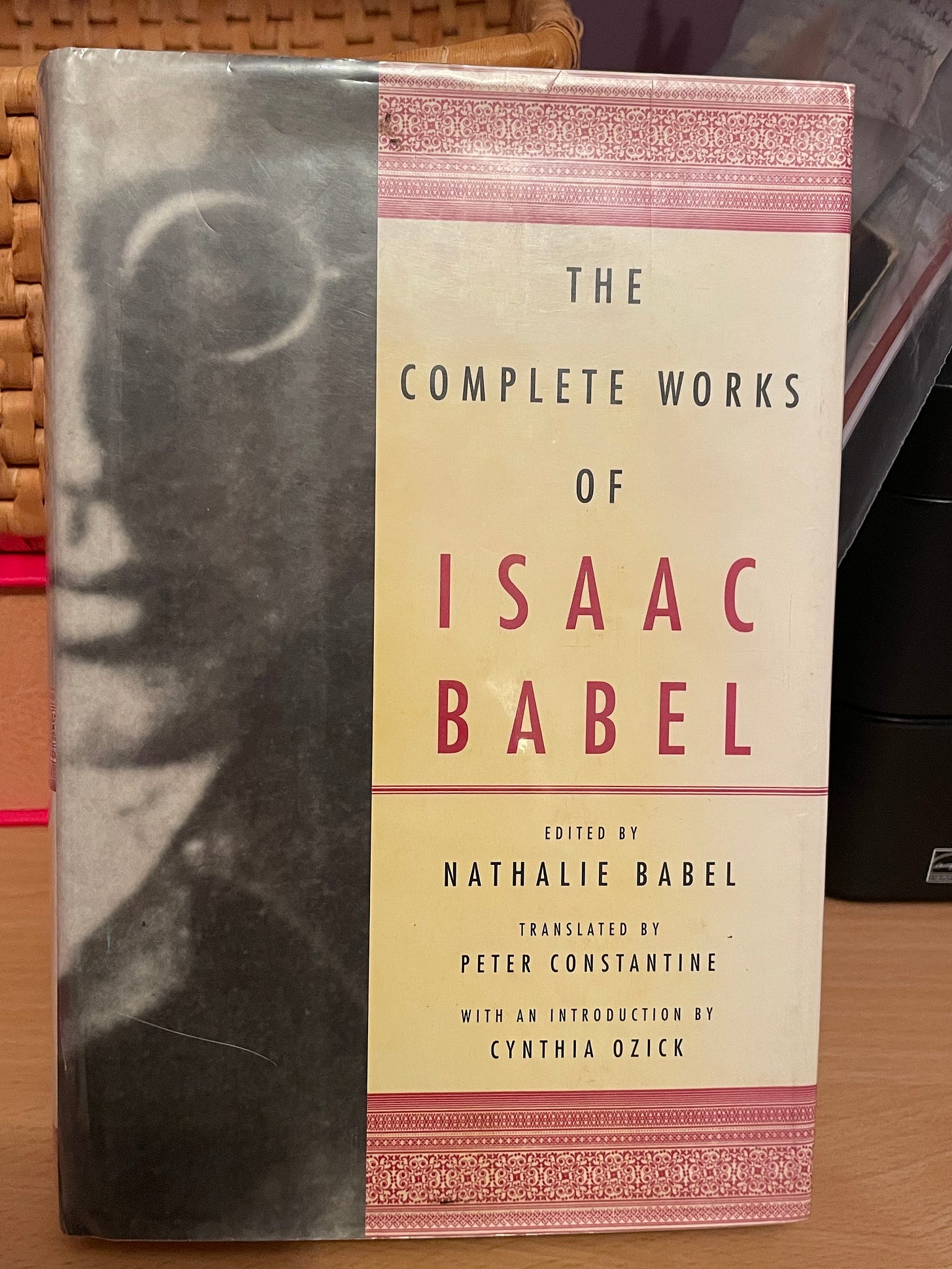READING GUY DE MAUPASSANT
In this Russian story written by Isaac Babel, we meet a poor man who edits translations of Maupassant's stories. In this beautifully crafted story, we begin to understand the power of choice.
The story I picked this week was Isaac Babel’s “Guy de Maupassant” and I must confess that I was intrigued by the title of this story originally conceived in Russian. I subscribe to
and that’s where I first heard about this gem of a story. The translation Saunders shared with us was by Efraim Sicher and while that’s the translation I read, please note that the picture above is of the collection, from my local library, of Babel’s stories translated by Peter Constantine.Even though I’m more like a failing D student in his thoughtful weekly sessions, what I love about Saunders’ Substack is that he exposes me to luminaries and their works. I’m that back bencher who, on some days, doesn’t know if she belongs there or not but loves hearing all the exchanges anyway.
Babel’s Guy de Maupassant is about a nameless no-good in St. Petersburg “with a forged passport and without a copeck” to his name who is nevertheless selective about the sort of jobs he wants to take on. The predicament of the man totally resonated with me. If I wish to take on a project, it must be one that excites me and makes me want to wake up to it every morning. Our narrator may be down on his luck but he ends up finding a place to sleep at the home of a man called Aleksey Kazantsev.
In November he does find a job that excites him. He not only finds the sort of editing work that he loves. He discovers he’ll be working for a wealthy woman called Raisa. It must also be said that while the money promises to be exciting, the company may be even more attractive. It turns out that Raisa, whose translations of Maupassant’s stories he will be editing, lives in a tony suburb of the city. This story must be on every reading list at least for the acerbic descriptions of the bourgeois life.
They lived on the corner of Nevsky and the Moyka, in a house that had been built from Finnish granite and decorated with pink columns, embrasures and stone coats of arms. Bankers without family or breeding, converts to the Christian faith who had got rich in the supply business, they had built a large number of these vulgar, pseudo-majestic castles in St Petersburg before the war. A red carpet ran up the staircase.
As he goes deeper into the work itself he also begins to be swept away by Raisa’s passion for Maupassant. Soon he’s enamored of Raisa herself. She has a rich husband who is more of a provider than a companion.
These women let their resourceful husbands’ money overflow into the rosy fat on their bellies, the back of their necks, their round shoulders. Their sleepy, delicately ironic smiles drive the garrison officers out of the their minds.
As Raisa watches the gentleman’s prowess in editing her work, we begin to understand what it means to see the melding of art and craft. Babel’s own sentences are evocative of this harmony.
She sat immobile during the reading, her hands clasped: those satin hands flowed to the floor, her forehead was pale, the lace between her downwards-crushed breasts moved aside and trembled.
“How did you do it?”
Then I began to speak of style, of the army of words, an army in which all kinds of weapons are on the move. No iron can enter the human heart as chillingly as a full stop placed at the right time.
In a brilliantly crafted scene overflowing with laughter, decadence and depravity, we watch Guy de Maupassant’s life interleave most ironically with that of the narrator.
The difference between our narrator-editor and Kazantsev who so generously gives him a place to stay is that one of them is excited by the job itself but does not let it consume him whereas the narrator does not quite comprehend how difficult it is to stay the course and not destroy the one lucky break that he has received. Choosing a path is often a very delicate dance in this thing called life, for it often entails finding something satisfying without squandering one’s sense of self, one’s moral compass, and one’s life.





THE POWER OF PUNCTUATION! “No iron can enter the human heart as chillingly as a full stop placed at the right time.” WOW. What a statement! I’ll be more careful with my full-stops from here on in, for fear that they may puncture a human heart!
Fascinating!